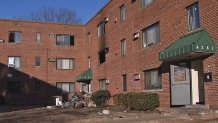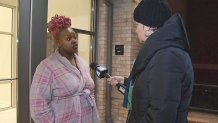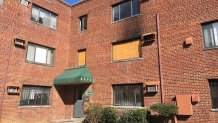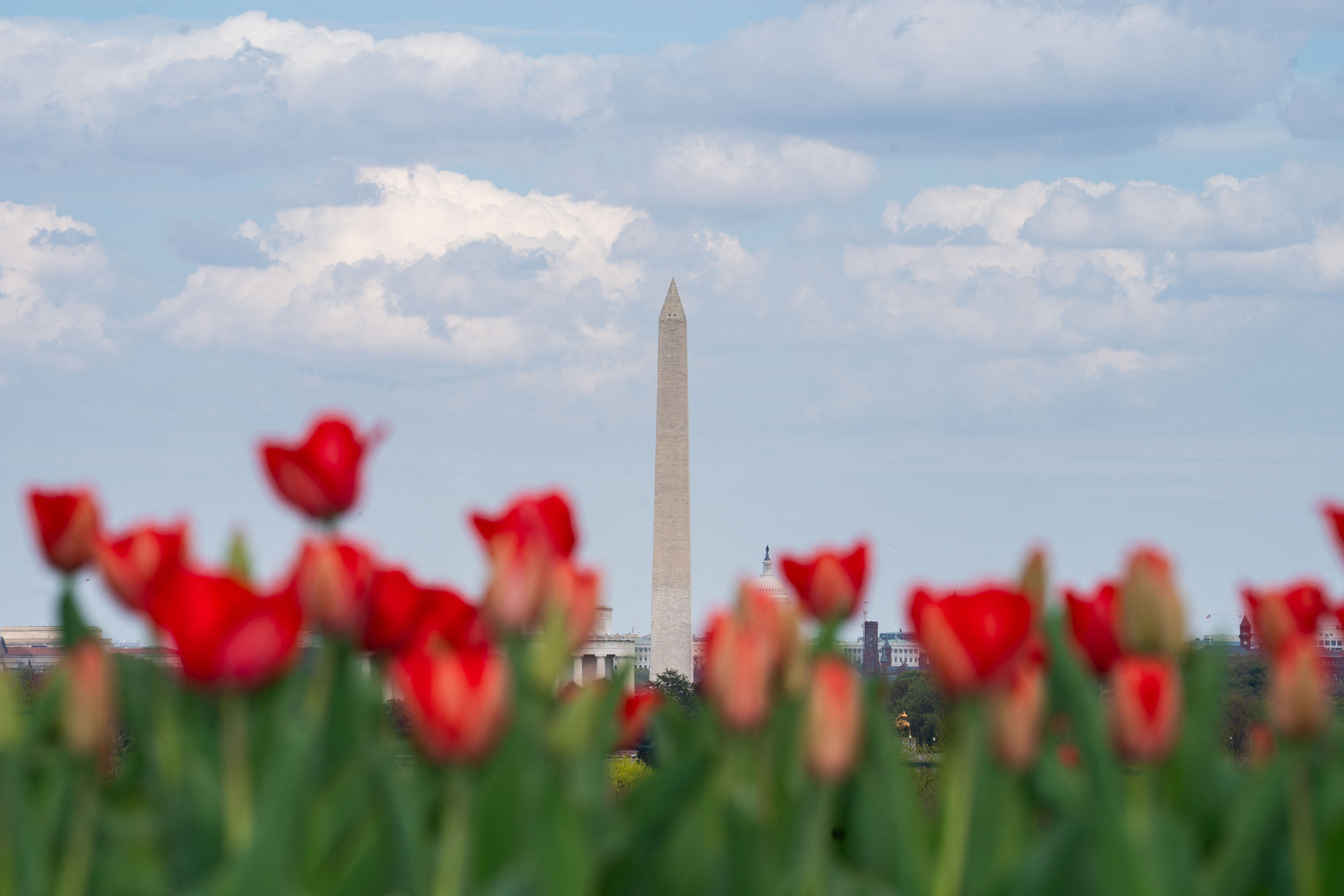The number of D.C. residents who reported living in buildings without functioning heat quadrupled in the city over four years. News4 digital reporter Andrea Swalec talks about the scope of the problem and what the city said they’ll do about it.
What to Know
- The number of D.C. residents who reported living without heat climbed over the past five years.
- Two months after a fire believed to have started because a man was using his stove for heat, his neighbors said they still have no heat.
- City officials told News4 they will restore heat to the complex in Southeast D.C. and put a lien on the property.
Franklin Gray was asleep in his apartment in Southeast D.C. when his niece jolted him awake. There was a fire, she said. They woke up her four young children, and Gray rushed to the living room window. Across the courtyard, in the building attached to theirs, a firefighter on a ladder was rescuing a man from a second-floor window as smoke poured out around him.
The man rescued from the fire early Jan. 18 suffered serious injuries, and 19 residents had to evacuate the building and go out into the bitter cold.
The stove in his apartment sparked the blaze, a fire department spokesman said. Neighbors suspect he had been using his stove for heat, as many residents of the Cascade Park Apartments do despite the safety risks.
Two months later, residents of the complex in the 4200 block of 6th Street SE say the heat in their buildings still doesn't work and their apartments are still so cold they use multiple space heaters, bundle their children up for bed and boil pots of water to try to stay warm. Gray said he uses the stove for heat himself.
"We use the stove all the time," Gray said. "If you go in the kitchen and you have to put on shoes and socks, you do it."
Spring can’t come soon enough for many D.C. residents. As windchills dropped to single digits this winter, hundreds of households have suffered through the season without adequate heat.
Local
Washington, D.C., Maryland and Virginia local news, events and information
D.C. Heat Complaints 2013-2017
The number of complaints in D.C. about apartments without adequate heat has climbed over the past five years, data from the D.C. Department of Consumer and Regulatory Affairs shows. Click on each ward to see the number of complaints per year, as well as trends over the past five years.
Source: D.C. Department of Consumer and Regulatory Affairs; D.C. Office of Planning; American Community Survey
May by Nina Lin/NBC
Despite growing prosperity in many parts of the city, the number of District residents who reported trouble meeting their basic need to stay warm at home climbed steadily over the past five years, city records show. In 2013, members of 72 households told the Department of Consumer and Regulatory Affairs (DCRA) that their landlords failed to provide adequate heat. In 2017, that number more than quadrupled, at 305 households. A housing lawyer and a neighborhood leader said they suspect that many more cases go unreported.
Residents of Ward 7 and Ward 8, the poorest parts of the city, were more than eight times more likely than residents of Ward 2 and Ward 3, the richest parts of the city, to report having inadequate heat at home last year.
In apartments where critics say landlords break rules that the city fails to enforce, families shiver.
"This is a frustrating situation because so many people are affected," said Gray, a 58-year-old who works in retail. He shares his three-bedroom apartment with his niece and her four children, who are 10, 9, 7 and 4 years old.
Gray said his calls to the company that manages the Cascade Park Apartments, ResidentialONE, go unanswered. The company did not respond to multiple calls and emails by News4.
DCRA told News4 that residents can expect relief. The agency says it issued building violations on Jan. 19 and 20, right after the fire, for failure to provide heat and other substandard housing conditions. The violations applied to three buildings in the complex, including Gray's building, but not to the building where the fire occurred. On March 7, inspectors checked the complex again and issued a notice of infraction because the problems had not been resolved. Fines of more than $12,000 are possible.

"Residents can be assured that our inspectors will continue to conduct additional inspections to determine if the violations have been abated," the agency said in a statement. "Also, we are enlisting our contractors to provide estimates on abatement costs for the unabated violations. DCRA will place a lien on the property for any abatement work."
The agency says it had not received any complaints this winter about a lack of heat in the complex. Information on previous complaints was not available.
Hours after the fire broke out at the Cascade Park Apartments, Advisory Neighborhood Commissioner Olivia Henderson held a community meeting. Henderson, who represents the area, had set up the meeting with city officials weeks earlier to discuss poor building conditions. She said some residents there told her they had not had consistent heat in their apartments for years. With limited affordable housing in the city, many residents have few other options but to stay.
"It’s very unacceptable," Henderson said. "You’re collecting all these tenants’ money. They should be able to live comfortably in their environment, and they’re definitely not able to do that now."
Neither she, nor the fire department spokesman, nor Cascade Park residents News4 spoke with knew the condition of the man who was hurt in the fire. Residents described him as a senior citizen.

Henderson said she suspects the actual number of households living without sufficient heat is much higher than the DCRA data shows. She said several residents told her they never reported the problem.
"They fear they’re going to get in trouble with the landlords. They’re afraid of retaliation," she said.
Lawyer Evan Henley, who represents low-income tenants in housing conditions cases, also said he believes that many more D.C. residents are coping without adequate heat than the official data reflects. He said he fields a steady stream of complaints, and it’s hard to hold landlords accountable.
DCRA says no-heat complaints are investigated immediately and a landlord cited for failure to provide adequate heat has one day to resolve the problem before being issued a violation and potentially fined $1,000.
Henley said that in his experience with Legal Aid Society clients over the past four years, the response is different. When someone does file a no-heat complaint with DCRA, it can take days for an inspector to come, he said.
Once an inspector does come, the temperature found can be misleading, Henley said. In some cases, a room will meet the winter requirement of at least 68 degrees in the daytime, but come nightfall, the temperature will plummet much lower. Or, if heat in an apartment works sporadically, an inspector might visit when it happens to be working.
If an inspector finds that a landlord is at fault, DCRA often gives them leeway in responding to the problem, Henley said.
"Even a tenant who does call DCRA might not receive much redress," he said.
DCRA, in contrast, says inspectors respond to no-heat complaints on the same day and conduct thorough evaluations.

The fire in the Cascade Park Apartments occurred just days before a majority of the members of the D.C. Council introduced a bill to split DCRA into two separate agencies: the Department of Buildings and the Department of Licensing and Consumer Protection. Critics say DCRA fails to protect rental residents and punish landlords who do not make needed repairs. The agency says they have made advances since Mayor Muriel Bowser took office in 2015.
"After a year of oversight hearings, it has become abundantly clear that DCRA is an agency in need of major change," D.C. Council Chairman Phil Mendelson said in a statement Jan. 23. "DCRA needs to do a better job – for both residents and businesses. I believe breaking up and reorganizing the agency is the best way."
At a hearing Oct. 2, Mendelson asked DCRA Director Melinda Bolling about how landlords who are issued housing violations can appeal fines.
"How long can I drag this out before I have to pay?" he inquired, as if he were a landlord, Washington City Paper first reported and video of the hearing shows.
"It could be years," Bolling replied.

DCRA is fighting the proposal to split the agency.
"Under the Bowser administration, DCRA has made some significant improvements in our quality of service and transparency of operations to better serve District residents and businesses," a statement said. "As such, we believe the current structure of the agency is appropriate and must be allowed to continue to operate as is."
Henley, the housing lawyer, said he would like to see DCRA split. It’s ineffective, and its mission is too broad, he said.
"I think it’s important that a landlord does face consequences for subjecting a tenant to poor conditions, and I just don’t see that happening," Henley said.
At the Cascade Park Apartments, Gray said he was pleased to hear DCRA said they would restore heat and put a lien on the property.
"You have to start somewhere," he said.



